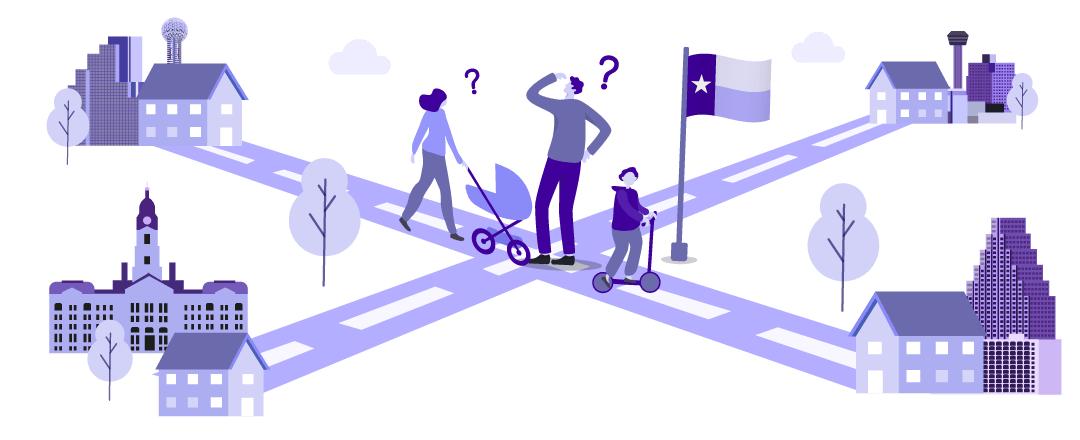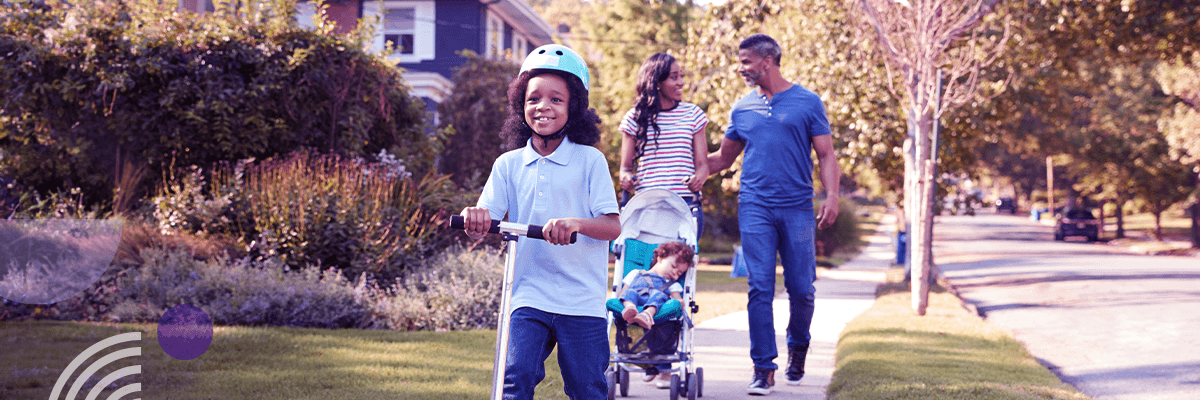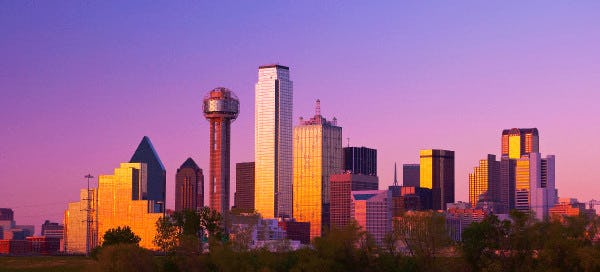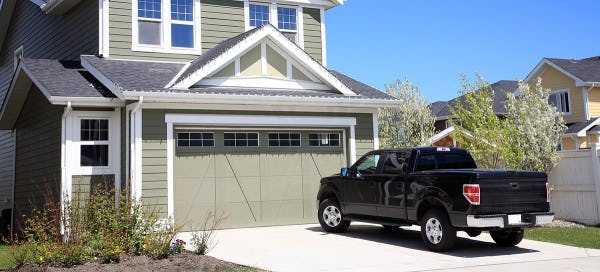Best Cities to Live in Texas with a Family
If you’re considering making a move to Texas and have children, you likely are interested in finding family-friendly neighborhoods. With so many great cities to choose from, great job potential, strong healthcare, low crime rates, and good education, it can be hard to narrow down the search!

We’ve put together a starting point for your research, featuring some of the top ranking cities for families in the Lone Star State. These tend to be smaller cities (population under or around 100,000) but they tend to be close to major hubs like Austin, Dallas, and Houston or the Louisiana or Mexico borders. We’ve also gathered helpful responses to some frequently asked questions to help you choose where in Texas might be right for you.
Tyler
According to a ranking by USA Today, Tyler tops the list of best cities to live in Texas – and many of the reasons that it’s a great place to live will appeal to families. Low unemployment, high access to healthcare, and lowest risk of damage from severe weather are notable features of the town, which is located in east Texas just an hour from the Louisiana border. Also known as the Rose Capital of America, the city has a relatively small size (109,000) and rural location, yet is home to one of Newsweek’s top hospitals in the country, UT Health East Texas system’s Tyler campus.
Harker Heights
According to Livability.com, Harker Heights is the quintessential Texas small town with a population of less than 30,000, many of whom are affiliated with nearby Fort Hood. It’s very affordable and sports a ton of kid-friendly activities, ranging from a skating rink to indoor climbing facility, community parks to the water recreation on Stillhouse Hollow Lake. More than a quarter of the town’s total population is school age, making it easy for your kids to make friends.
Pearland
Another city that ranks high for families is Pearland, a growing suburb of Houston. Here, the low crime and high quality of life of a small town combine with access to Houston’s big-city amenities and thriving job market. The cost of living in Pearland falls below the national average, with home prices that enable 79% of residents to be homeowners. With a population of 126,000, it also has two major retail centers, the award-winning Texas Pediatrics, and a strong parks and recreation system. The Pearland Independent School District received an 8 out of 10 rating by greatschools.org.
Cedar Park
Only 20 miles outside of downtown Austin, Cedar Park has a population of 78,000, low crime rate, unemployment of only 3%, and a high median income thanks to major manufacturing employers and the Cedar Park Regional Medical Center. The city also hosts two minor league sports teams, the Austin Spurs for basketball and Texas Stars for hockey. Add to this the proximity to Austin, with its vibrant life and excellent job opportunities, and it’s easy to see why this is a great place to put down roots.
Temple
With a population of just under 90,000, one major draw to Temple is its location halfway between Waco and Austin. The town boasts the most primary care physicians per capita (10 per 10,000 residents) as well as a campus of the famous Baylor Scott & White Medical Center. Unemployment is only 3.4%, real estate is affordable, and Temple schools are among the highest rated in the state.
New Braunfels
One of the fastest growing cities in the state (population 104,000), New Braunfels is located just half an hour from San Antonio. The school districts are rated 9 out of 10, and both crime and unemployment are low. It also offers many family-friendly activities, from tubing on the Guadalupe River to splashing around at Schlitterbahn waterpark.
No matter what you’re looking for, there is a place in Texas for you. And when you arrive, we’re ready to serve you with 100% renewable energy and plans that are tailored to your priorities, lifestyle, and budget. Visit gotrhythm.com and enter a zip code that you’re considering, to find out what rates are available by location.
FAQ
What are the safest neighborhoods in Texas for families?
Even though Texas’ crime rates are higher than national averages, the Lone Star State's safest cities boast 84% less violent crime and 66% less property crime than the rest of the state. According to safewise.com, the safest cities tend to be smaller ones outside of Wichita Falls, Austin, Pasadena, Waco, and more, with Melissa, San Elizario, and Fulshear topping the list.
Where are the best public schools in Texas?
According to the Austin Statesman, U.S. News analyzed a total of 1,555 public high schools in Texas, and Dallas has four of the top ten, Houston has two, with Grand Prairie, Austin, San Antonio, and Brownsville rounding out the list. Visit U.S. News to see the full overview and rankings.
Which areas in Texas have the best private school options?
There are 2,029 serving students in Texas, and Private School Review has ranked the top ones. 6% of all K-12 students in the state are educated in private schools, compared to the national average of 10%. The average private school tuition is $10,718 for elementary schools and $12,131 for high schools. The average acceptance rate is 85%, minority enrollment is 41% and the student-teacher ratio is 10:1. Leading cities are Houston, Austin, Dallas, San Antonio, and Fort Worth.
What are the best recreational activities for families in Texas?
Natural Bridge Caverns in San Antonio
These underground caverns are remarkable geological formations that are ideal for a visit no matter what time of year. Perfect for all ages of visitors, these feature amazing, well-lit limestone formations and pools connected throughout by footpaths.
Route 66 Historic District in Amarillo
Located along what is perhaps the most famous highway in America, this historic district is a personification of the American West. It’s chock full of vintage shops, public art, and retro diners and lounges for your family’s enjoyment.
This is the location of NASA’s Historic Mission Control, where children can get hands-on experiences with the engineers and astronauts who lead America’s space exploration. Interactive exhibits, a theater for educational films, and the original mission control that monitored Apollo trips to the moon are on display.
Dude Ranch in Dallas-Fort Worth
Family friendly and fun for all, dude ranches make everyone feel welcome and engaged at home on the range. Here kids can go horseback riding or take a jeep tour, and some even offer swimming, while parents can participate in shooting sport clays and relaxing at on-site spas.
Moody Gardens in Galveston
An educational amusement park that boasts an aquarium, indoor rainforest, seaside ropes course and outdoor zip line, Moody Gardens also offers seasonal events like a water park, ice sculpting, and a holiday festival of lights.
Beach & Backwater Adventures in South Padre Island
Idyllic beaches on an island in the Gulf of Mexico… need we say more? Highly popular with families, South Padre Island offers surfing, kayaking, paddle boarding, and kite surfing. Every fall, the island even invites local sculptors to participate in Sandcastle Days, which highlights coastal conservation.
Big Bend and Guadalupe Mountains National Parks
The two national parks in Texas are Guadalupe Mountains and Big Bend. Guadalupe Mountains is famous for its fall foliage tours and prairie wildlife, while Big Bend lets you experience the cool waters of the Rio Grande and towering canyon walls while boating, biking, or hiking.
Visit a World of STEM or Pick Berries and Pumpkins in Hill Country
North of Austin, kids can visit Science Mill, a world of science, technology, engineering, and math with its educational and inspiring interactive exhibits and high-tech games. Or families can pick their own strawberries in the spring and pumpkins in the fall at Sweet Berry Farm, or even play with animals at the petting zoo or explore the massive kid-friendly maze shaped like the Lone Star State.
What are the average childcare costs in family-friendly Texas cities?
The cost of childcare depends on where you live in Texas. According to winnie.com, this is a breakdown of the average cost of childcare in major cities:
Houston: $770 per month is the average cost of childcare in Houston, Texas.
Dallas: The average cost of daycare in Dallas is $900 dollars per child.
Austin: It costs an average of $890 a month for childcare in Austin.
San Antonio: San Antonio daycares cost an average of $760 a month for full-time care.
How do healthcare facilities in Texas compare in family-oriented neighborhoods?
In addition to great medical facilities in cities like Tyler, Pearland, and Cedar Park mentioned above, major cities in our state also have world-leading hospital systems. Out of 592 hospitals in Texas evaluated by U.S. News, thirty meet their high standards. Highest ranked are Houston Methodist Hospital and University of Texas Southwestern Medical Center in Dallas, closely followed by Baylor St. Luke’s in Houston, Baylor University Medical Center in Dallas, and other hospitals in Temple and Austin. Click here to read the full report.
Are there any tax benefits for families living in Texas?
Of course, Texas has no state income tax, which is already an advantage over other states. But there’s more: in Texas, the child tax credit increased in 2021 to $3,600 per child age 0-5 and $3,000 per child age 6-17. This is not a loan, it is a cash benefit for families that is fully refundable, meaning that even if you don’t owe taxes you could still get the full credit. It also has no minimum income requirement; you can make zero income and still claim the credit. For more information, visit raisetexas.org.
How do transportation options vary in the best Texas cities?
The Dallas-Fort Worth area is well-known for being quite spread out, and driving from one side of the metroplex to the other often takes more than an hour. With 95 miles of metro rail line known as DART (Dallas Area Rapid Transit), you can stay connected whether you live downtown or in the suburbs. DART has 65 rail stations, four downtown rail lines plus streetcars, and three suburban lines. The rail-bus combination connects many area suburbs to the downtown core.
Austin’s CapMetro bus system encompasses most of the city, with routes running north and south from the suburbs through downtown. The Flyer and Rapid Routes express commuter buses connect the suburbs to the city with limited stops. There is also a rail service that runs 32 miles between downtown and the northern suburb of Leander, with nine stations along the way, each of which is also served by a bus route.
And Houston’s robust METRO bus system, along with a small but effective light rail, is very popular with residents, making it easy to commute to work without a car.
Are there good shopping amenities in family-friendly areas of Texas?
There are many! One of the most popular is the Galleria in Houston, which brings an exciting mix of shopping, eateries, and even a skating rink.
Another is Gruene Historic District, within the city limits of New Braunfels. A snapshot of Texas history come to life, it has 15 walkable acres that have been designated a National Historic District where visitors can shop, eat, and play within the original township buildings.
Historic Market Square in San Antonio brings together more than 100 locally owned shops and businesses, making it one of the largest Mexican markets north of the border. Nearly every weekend brings live entertainment and fun for the whole family, along with shopping for unique multicultural merchandise.
How do Texas cities support families with special needs children?
Texas has a network of 20 Education Service Centers (ESC) that offer training and support for parents as well as services to local school districts. If you are looking for help working with a local school to get special education services for your child, you can call the special education contact at your regional ESC.
In Dallas-Fort Worth alone, there are over 250,000 people living with a cognitive disability. The Community for Permanent Supported Housing is a non-profit organization that is dedicated to helping families find supportive community-based housing for special needs children as they become adults.
Are sports and physical activity programs widely available for children in Texas?
Texas is definitely an active and sports-minded state, with recreational opportunities ranging from surfing to soccer, basketball to baseball, rock climbing to mountain biking. Our major and minor league sports teams often host camps for children, and the school systems make sports a priority. Of course, in Texas football is king, whether it’s a casual game with friends in the park or a development league for kids.




